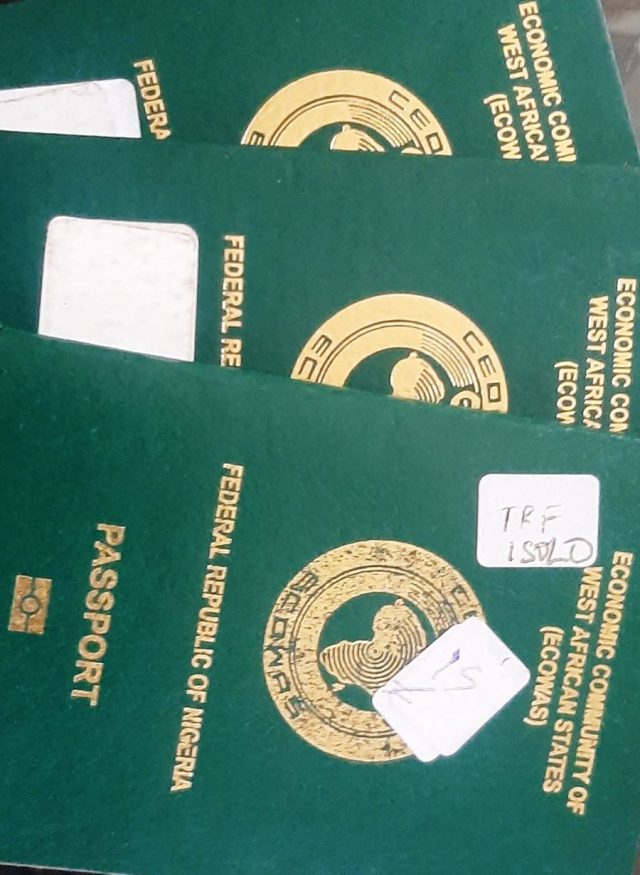…Only 17 countries’ passport holders can visit Nigeria visa-free for tourism purposes. and they are all African countries-West African countries
WED JAN 08 2025-theGBJournal| Nigeria climbed five places from 92nd in 2024 to 87th spot in 2025 on the latest Henley Passport Index, a ranking of the world’s passport based on the number of destinations their holders can access without a prior visa.
Nigeria’s ranking has fluctuated between 2021 to date-from an all time low of 103rd in 2021 to its current position.
Egypt and Nigeria, in Africa, share same position lower than South Africa, which is ranked 47th currently.
Analysts tells theG&BJournal that Nigeria’s ranking is held down by a number of factors, including lack of reciprocity.
As of January 2025, Nigerian passport holders can access only 28 countries and territories visa-free, can only enter other countries, Nigerians may need to apply for an Electronic Travel Authorization (eTA) or visa online. A few countries may allow Nigerians visa on arrival.
On the contrary, only 17 countries’ passport holders can visit Nigeria visa-free for tourism purposes. and they are all African countries-West African countries.
According to Henley Passport Index press statement, Singapore and Japan break away from the group of six countries that shared top spot last year to secure gold and silver, respectively, on the 2025 Henley Passport Index, which ranks all the world’s 199 passports according to the number of destinations they can access visa-free, and is based on exclusive Timatic data from the International Air Transport Association (IATA).
Several EU member states, — France, Germany, Italy, and Spain — drop two places in the ranking to 3rd position, and are joined by Finland and South Korea, which each lost a place over the past 12 months and now have access to 192 destinations with no prior visa required.
A seven-nation EU cohort, all with visa-free access to 191 destinations — Austria, Denmark, Ireland, Luxembourg, Netherlands, Norway, and Sweden — share 4th place, while five countries — Belgium, New Zealand, Portugal, Switzerland, and the UK — come in 5th with 190 visa-free destinations.
The rest of the index’s Top 10 is largely dominated by European countries, except for Australia (6th place with 189 destinations), Canada (7th place with 188 destinations), the US (9th place with 186 destinations), and the UAE, the first and only Arab state to ever make it into the upper echelons of the rankings.
The UAE is one of the biggest climbers on the index over the past decade, having secured access to an additional 72 destinations since 2015, enabling it to climb 32 places to 10th spot with visa-free access to 185 destinations worldwide.
The latest Henley Passport Index also reveal grave visa racism for Schengen visa, as Africans twice are likely to be rejected for Schengen visas.
A new exclusive new research conducted for Henley & Partners and published in the Henley Global Mobility Report 2025 Q1, Prof. Mehari Taddele Maru of the School of Transnational Governance and the Migration Policy Centre at the European University Institute and of Johns Hopkins University School of Advanced International Studies, compared Schengen visa rejection rates for African applicants to those from other regions.
“My latest research compares the 10 countries facing the highest Schengen visa rejection rates and reveals that while globally only one in six applications is rejected, one in two African applicants is rejected. In 2023, African countries accounted for just 2.8% of global applications out of a total of over 10 million worldwide, yet half of their applications were rejected. Even more concerning is that this trend has worsened over the past decade, with rejection rates more than doubling during this period.”
The research shows that among the top 10 countries facing the highest Schengen visa rejection rates, six are in Africa. Comoros fares the worst with a 61.3% rejection rate, followed by Guinea-Bissau at 51%, Ghana at 47.5%, Mali at 46.1%, Sudan at 42.3%, and Senegal at 41.2%.
Three Asian countries and a European country complete the most-rejected list: Pakistan with 49.6%, Syria with 46%, and Bangladesh with 43.3%. The contrast becomes particularly stark when comparing Africa with Asia and global rates. Despite African countries submitting only half as many applications as Asian countries, African applicants were twice as likely to be rejected.
Prof. Maru says this pattern suggests that the variation in rejection rates between regions and nationalities extends beyond purely economic factors. “This growing disparity in visa rejection rates contributes to a broader pattern of global mobility inequality.
As a result, African citizens find themselves at the bottom of the mobility ladder, which significantly limits their access to international economic opportunities.
In short, the poorest individuals face the greatest difficulties when seeking to travel or move to more prosperous countries. I would argue that weak economies and discriminatory policies based on identity and culture explain the high rate of rejection for African Schengen visa applicants.”
X-@theGBJournal|Facebook-the Government and Business Journal|email:gbj@govbusinessjournal.com|govandbusinessj@gmail.com










